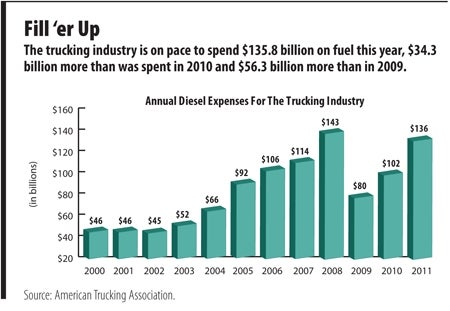Imagine getting 5½ miles to the gallon and paying more than $4 for it. Welcome to the world of transporting freight.
Buz Reusch, vice president of Rushco Services Inc. in North Oxford, said his trucking company watches the price of diesel like a hawk.
“That’s a major cost for us or any trucking company,” Reusch said. “Of course it does stress us to some extent.”
A recent AAA Southern New England survey found diesel averaging $4.15 per gallon in Massachusetts with regular unleaded gasoline averaging $3.66 per gallon. Gas prices have been on the rise and are expected to continue to climb through the summer. Some parts of the country are already dealing with gas prices at the pump in excess of $4 per gallon.
Cutting Back
No industry would like to cut down on fuel use more than the trucking industry, and Reusch said that Rushco has done all it can to trim costs.
The company requires its drivers to take the most direct routes to their destinations and is a member of a national network of 600 fueling stations that provides small discounts, up to 5 cents per gallon, on diesel for its members, he said.
But a trucking company like his can only do so much to stem what is essentially an unavoidable cost, and one that is rising, Reusch said. The company is forced to increase rates as the price of diesel climbs, he said.
“We’re here to make a living and make a living for our drivers,” he said.
The American Trucking Association testified March 31 before the House of Representatives’ Committee on Natural Resources that sustained high fuel prices will mean an increasing number of trucking companies going out of business.
ATA President and CEO William P. Graves told legislators that high fuel costs dampen demand for freight because people are paying more for products and have less to spend overall.
Reusch said that he understands how high fuel costs could put a company out of business.
Some larger companies have low rate structures that mean low margins, which can be heavily impacted by upward pressure in fuel costs, he said.
On the other hand, some smaller companies don’t project out far enough what their costs are going to be.
As a result, when the bill comes due, they might find themselves not able to pay all of their bills.
“Now they’re stuck,” Reusch said.
Worcester-based Polar Beverages is feeling the pressure on its fleet of vehicles, which travel all over New England delivering product, said Executive Vice President Christopher Crowley.
“It’s hundreds of thousands of dollars a quarter,” Crowley said. “It’s more than we budgeted as well.”
But it’s not just diesel fuel that has Crowley shaking his head. Polyester resin, which is used to make Polar’s plastic bottles, has also shot up in price because oil is one of its components.
And so has the corn sugar Polar uses as an ingredient, a development Crowley blames on the use of corn for ethanol. Even aluminum costs have increased to around $1.20 per pound from between 60 cents and 85 cents a year prior.
All of those increases combined are among the steepest Crowley has ever seen. He said that the company has been investing in efficient technologies to trim costs where it can.Polar just spent $250,000 on new water heaters to use at its plant.
“Everything is energy,” Crowley said. “So you want to invest in the most efficient way of doing it.”

